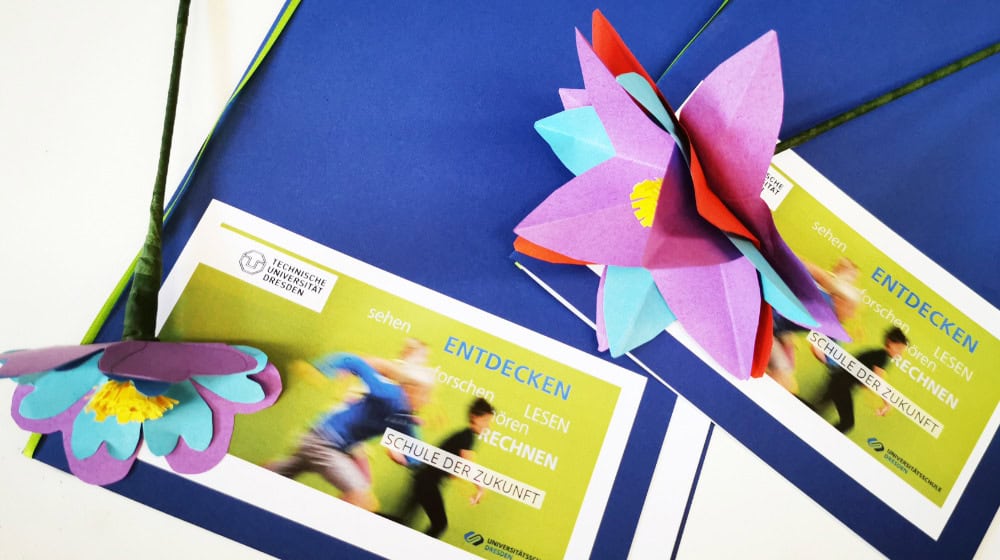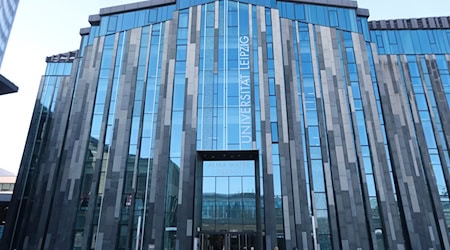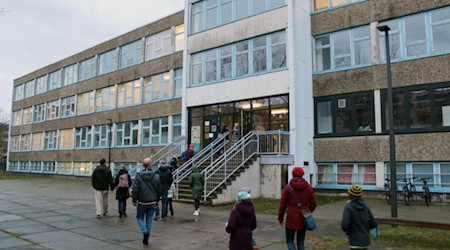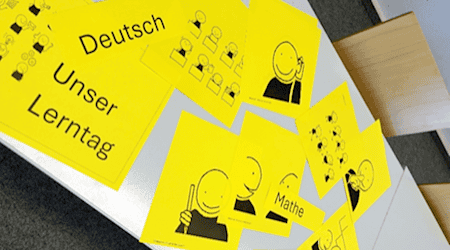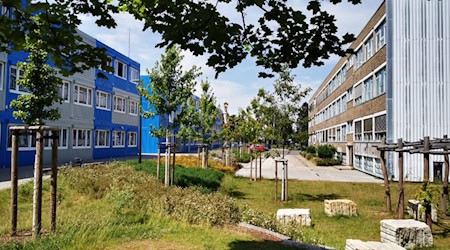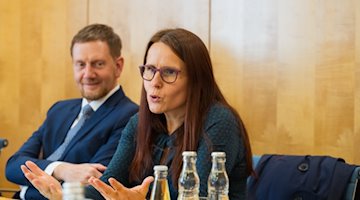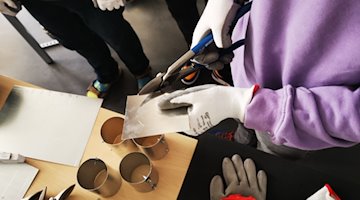June 14, 2024 was a very special day, and not just for eight Year 9 students at the University School Dresden. They received their certificates for successfully completing secondary school at a ceremony at TU Dresden. It was also a special day for the entire school community, as the first final examinations since the school was founded in August 2019 were held in May and June.
For the first time again, grades for the school-leaving certificate
All eight candidates in the year group of 57 students successfully completed their secondary general school certificate, and five of them even achieved a qualified secondary general school certificate (Hauptschulabschluss), i.e. very good grades and examination results. Since the exemption from grades in the 2020/21 school year, they also received numerical grades again for the first time in addition to feedback and performance documentation in the school and learning management software. The qualified Hauptschulabschluss entitles the young people to continue studying at the Dresden University School and prepare for the Realschulabschluss after Year 10.
Making transitions possible in community
The mixed year and level groups at a "school for all" make this transition easier, as well as the transition to the Abitur later on. The pathways are more permeable, because in the mixed groups, children and young people can always work on tasks at the different levels for Hauptschule, Realschule and Gymnasium in the different perspectives - instead of subjects, University School Dresden has the areas of languages, mathematics & natural sciences, social sciences. The students are therefore well prepared for further learning with the qualified Hauptschulabschluss and remain in their social group.
For learning facilitator Nino Haustein, learning at one of Saxony's first community schools primarily means community: "At Dresden University School we fill the word 'community' with life, therefore it's not unusual that secondary school students learn with special needs students and form friendships. We cultivate a culture in which it is okay to develop your own potential later on."
"With its concept that focuses on individual needs, Dresden University School enables children and young people to develop their personalities and skills in a special way. With their individual development, each graduate shows once again that learning paths are not predictable and that one cannot assume a linear progression. Instead of an early division into the usual types of school and corresponding qualifications (special school / Fördersschule, secondary school / Oberschule, grammar school / Gymnasium), it is important to create a supportive environment for pupils to learn together and to strengthen them with confidence in their abilities," adds Prof. Anke Langner, Head of the University School Research Center and responsible for the scientific monitoring of the joint school trial of the City of Dresden and TU Dresden.
As pioneers, they have mastered extraordinary challenges
For school principal Maxi Heß, the eight students have not only successfully completed their secondary school diploma, but have also made history: "They are the first students at Dresden University School to reach this milestone and are therefore pioneers who have paved the way for many generations of students to come. They can really be very proud of this."
The teacher finds this achievement particularly remarkable, as the young people have mastered their time at school under extraordinary circumstances: "In 2019, most of them co-founded our university school in Dresden, just like us learning support staff, and embarked on an extraordinary journey with us. Just six months later, the coronavirus pandemic turned all of our lives upside down and also posed major challenges for learning and teaching. The (then still) children had to get used to online lessons, learn independently without their classmates and often do without familiar structures and support. However, they have proven that even in difficult times, they do not give up and adapt to the new conditions. They have shown that they are flexible, resilient and determined."
What happens after the excellent graduation?
The committed head of the "School of the Future" in Dresden points out: "In addition, the Dresden University School was and is still under construction. Learning in such a young school means that not everything works perfectly right from the start." With this in mind, the learning facilitator team is particularly proud of Jannes Thiele and Lars Voigt, who are among the best exam candidates in Saxony. They were honored by Minister of Education Christian Piwarz in the Frauenkirche for this special achievement together with the 160 best graduates of Saxony's special and secondary schools.
But what happens after graduation and how well prepared are they for their future careers? Award-winning student Jannes initially had a carpentry apprenticeship in mind at his internship company, "but unfortunately the company isn't taking on any new apprentices this year. During my Friday work placement in Year 8, I spent one day a week in a carpentry workshop throughout the whole school year and found the right career for me. Now I'm preparing for my secondary school leaving certificate at the university school for one more year and maybe I'll be able to work in my dream company." Otherwise, a basic vocational training year in wood technology is a good opportunity for him to pursue his career aspirations, says the well-informed graduate.
Self-determined and practical learning motivates
For him, the switch to the university school in year 6 was a good decision: "The free project work is particularly great because we don't just rattle off the theoretical material, but also look for additional tasks ourselves, for example making a product for the project presentation. That's motivating, of course! My favorite project in the science perspective was making various everyday objects from metals and alloys, such as lead balls, aluminum bowls, copper coins and silver jewelry." He always feels well supported by the learning guides.
University student Clara would first like to complete a voluntary year and take a closer look at various professions: "I spent a year in a daycare center during my Friday internship and for the 9th grade internship I spent two weeks at the zoo looking after the giraffes and zebras, donkeys and kangaroos. It was quite exhausting, but also a lot of fun because I just love animals." In the coming weeks, she will spend a few taster days getting to know a farm and a riding stable, visit another nursery and also the primary school at Dresden University School. "That's actually my school, but it's a different building. It looks completely different in the container building and the learning guides are not the same either. I already know some of them and they are very nice." Riding school, daycare center or university school? She will decide what to do after the summer vacations after the taster days.
Further growth and challenges
Ahead of the school community, which moved into the old GDR building on Cämmerswalder Straße in 2019 with 200 children in grades 1, 2, 3 and 5, lie numerous other milestones. "Dresden University School means change," says principal Maxi Heß, summarizing what the school community will shape: the first secondary school examination in the 2024/25 school year, the further growth of the student body to around 1,000 children and young people in a community school with a grammar school upper level and the move to a contemporary learning building.
"But today we are celebrating! I would like to give the first graduates this piece of advice: Stay curious and open to new things. The world is constantly changing and offers countless opportunities. Use the skills and knowledge you have acquired at Dresden University School to develop your skills and explore new avenues. Be courageous and dare to make mistakes in order to learn and grow from them."
About the University School Dresden
The University School Dresden is a joint project of the state capital Dresden and the Technical University. It is a public and free community school run by the city, where innovative forms of teaching and learning are tested under academic supervision. In addition, it is a training school for future teachers and, in the future, a further education school for teachers. The school trial is being scientifically supported by the ForUS research center at TU Dresden.
Information on the research project at TU Dresden: https://tu-dresden.de/gsw/unischule
Information about Dresden University School: https://universitaetsschule.org
You can find insights into the research project and everyday school life on various social media channels under @unischuleTUD. Follow the links to the University School Dresden on Facebook, X-Twitter, Instagram, YouTube and LinkedIn. You can also regularly read news from the Dresden University School project in the Newsletter of the Humanities and Social Sciences Division.

